Why are relations between France and Italy generally frosty? That’s one of the great mysteries of European integration. It is only now that Emmanuel Macron is trying to mend fences.
On paper, France and Italy seem like lovers destined for each other. The “sister republics” are each other’s second biggest trading partner, and perhaps more importantly, they have a natural cultural affinity. It doesn’t need an equivalent to the Franco-German TV channel Arte for Italy and France to become their film industries’s respective biggest foreign audiences.
Still, the EU’s two largest Latin countries have rarely formed a power couple. After World War II, France’s political elite did not trust post-fascist Italy and wanted the Italians kept out of NATO. In the 1960s, Charles de Gaulle felt offended when Rome did not follow his lead but rather welcomed American military bases and supported a supranational Europe instead of his vision of a “Europe des États.”
It didn’t help that the French and Italian left cultivated close ties in the 1980s and François Mitterrand gave asylum to members of the terrorist Brigate Rosse. And in 2000s, at the height of the Iraq crisis, Jacques Chirac snubbed then Prime Minister Silvio Berlusconi, telling him, “One doesn’t export democracy with an armored car.” In France, the one-liner is part of every Chirac Greatest Hits album. But this did not prevent his successor Nicolas Sarkozy from ousting Libyan dictator Muammar Gaddafi in 2011—against Rome’s express protests.
Stand-Off
If recent European history is full of Franco-Italian skirmishes, the recent years under Emmanuel Macron have been no exception. Long before the Five Star Movement and the far-right Lega acceded to power in June 2018, Macron repeated France’s classic mistake of taking Italy’s support for granted or simply not caring about antagonizing Rome.
Once in the Elysée, Macron barred rescue vessels carrying migrants from docking in French ports and decided to maintain checks on the Italian border, which left asylum seekers stranded at Ventimiglia. Macron also did not hesitate to block an Italian takeover of a French ship-building yard and undermine Italy’s long-standing Libya policy.
Rome supports the UN-recognized government in Tripoli. It dominates Libya’s west, which is key to controlling migration across the Mediterranean. Macron’s primary Libyan concern, however, was to secure the Sahel region. This led Paris to throw its weight behind Khalifa Haftar. The general, once an exile in the United States, vowed to go after Islamic terrorists and even seems to have received French arms to that purpose. But Haftar used them to march on Tripoli in the spring of 2019 in an attempt to overthrow the government.
While across the Rhine, the French president is seen as a great European, the Italians discovered Macron’s Gaullist and unilateralist side early on. In Italy, anti-French rhetoric has come to replace anti-German sentiment.
“A Chance to Be Seized”
It is only now that Macron seems to have finally understood that Italy—more than any other country—is the decisive battleground for the EU’s future.
There is of course the economic question. Italy’s 132 percent debt-to-GDP ratio is the bomb that could blow up the currency union—and French companies are Italy’s largest foreign investors. But in a world of ultra-low interest rates, the debt elephant in the room can be ignored for a while.
The real problem is political. The specter of a far-right prime minister taking over in Rome has focused minds in Paris. Lega leader Matteo Salvini would not only have frustrated most of Macron’s plans in Brussels. Perhaps more crucially, the Italian far-right ditching coalition partners and rising to power on its own would have allowed Marine Le Pen’s Rassemblement National to lose its stigma of unelectability, which is what got Macron into the Elysée in the first place.
That Salvini locked himself out of power this summer is, in this context, seen as a godsend that comes with responsibility. As French Finance Minister Bruno Le Maire said, “We believe having a new Italian government is a chance, and chances have to be seized”.
The Elysée is keen to make sure the Italians regain confidence in the EU. The French president was the first head of state to pay a visit to Giuseppe Conte’s second government, formed by M5S and Italy’s Social Democrats (PD) in September. Paris is lobbying Brussels to allow Conte some fiscal breathing space. On Libya, Macron has let Berlin take over to try to mediate a solution as Paris has lost its pretense of neutrality.
Paris is also the main force behind a renewed push for a mechanism distributing incoming asylum-seekers across the EU—an old Italian demand. This is not completely without self-interest on Macron’s part. France is recording rising numbers of asylum-seekers. Those rejected by other EU countries come to France hoping for better treatment. Macron realizes that shutting the border with Italy doesn’t solve the problem.
No Time for Renzi
Lastly, Macron has stopped playing domestic politics in Italy. In parallel to the government of the day in Rome, Macron had entertained a relationship with Matteo Renzi, the former PD leader. Macron even flirted with the idea of allying with Renzi in the European elections. He was a constant factor of insecurity in Italy’s political landscape.
Last month, Renzi exited the PD to found his break-away Italia Viva party. Importantly, Macron chose not to meet Renzi when he jetted to Rome. Italy’s government is notoriously unstable. But the Elysée has no interest in Renzi breaking away from Conte’s second government and provoking snap elections—at least not before Macron faces his own rendezvous with the French electorate in 2022.
Europe is slowly realizing that Conte must be helped if Salvini is to be kept out of power. In this context, a Franco-Italian allaince may finally become a viable force in Brussels.







